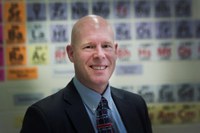Visiting professorships in 2016
The Liebig-College invites every year visiting research professor, who give top-caliber lectures and seminars complementary to the themes of the JLU research groups. In 2016 our visiting research professors were:
Prof. Edyta M. Greer (Baruch College, New York) |
|
|
|
Professor Edyta M. Greers research centers on mechanistic studies of biological activities of natural products, in particular reactions producing diradicals. She uses computational methods to examine factors that effect rate of cycloaromatization reactions producing diradicals, which exhibit clinical antitumor and antibacterial activity. By doing this, in collaboration with Charles Doubleday, she modified available computational methods to assess contributions of carbon atom tunneling on the rate of formation of para-benzyne (Bergman cyclization) and α,3-didehydrotoluene (Myers-Saito cyclization) that underlie the toxicity of the natural products calicheamicin γ1I and neocarzinostatin. Professor Greer was our Liebig-Lecturer from 18th - 29th July. |
Prof. Matthew S. Sigman (University of Utah, Salt Lake City) |
|
|
|
The Sigman research program explores the broad areas of oxidation catalysis, asymmetric catalysis, and the relationship between structure and function in complex reactions. Professor Sigman was our visiting Professor from 10th - 18th August. |
Prof. Ivan Aprahamian (Darthmouth College, Hanover) |
|
|
|
Professor Aprahamian's research group works on developing hydrazone-based functional materials, such as molecular switches, sensors and fluorophores. They are interested in developing structurally simple molecular switches that can be used in complicated functions, and the hydrazone functional group is well suited for this approach. Recently they have been focused on developing chemically activated switches that can lead to adaptive out-of-equilbrium systems. To achieve this goal they rely on a systems chemistry approach to develop hydrazone switches that lead to cascades of reactions, and different types of feedback loops that are important for self-regulation. Another thrust in is photopharamacology, where the group develops near infrared light activated switches that can potentially be used in the non-invasive modulation of drug efficacy. Professor Aprahamian was our guest from 25. August - 4. September. |
Prof. Graham J. Bodwell (Memorial University, St. John's) |
|
 |
Research in the Bodwell group is focussed on the synthesis and study of designed pi systems, including cyclophanes, nonplanar aromatic compounds, pyrene-based molecules/materials, electron-deficient dienes and their inverse electron demand Diels-Alder reactions, heteroaromatic compounds, and heteroaromatic natural products. Professor Bodwell was our Liebig-Lecturer from 02th - 08th October. |
Prof. Scott J. Miller (Yale University, New Haven) |
|
 |
Professor Miller’s research program focuses on problems in catalysis.. His group employs strategies that include catalyst design, the development of combinatorial techniques for catalyst screening, and the application of these approaches to the preparation of biologically active agents. Three particular interests of his laboratory are: (a) the selective functionalization of complex molecules, (b) the exploration of potential analogies between synthetic catalysts and enzymes and (c) the discovery of molecules that are effective antibiotics despite increasing resistance challenges. Professor Miller was our Liebig-Lecturer from 17th - 22th October. |



